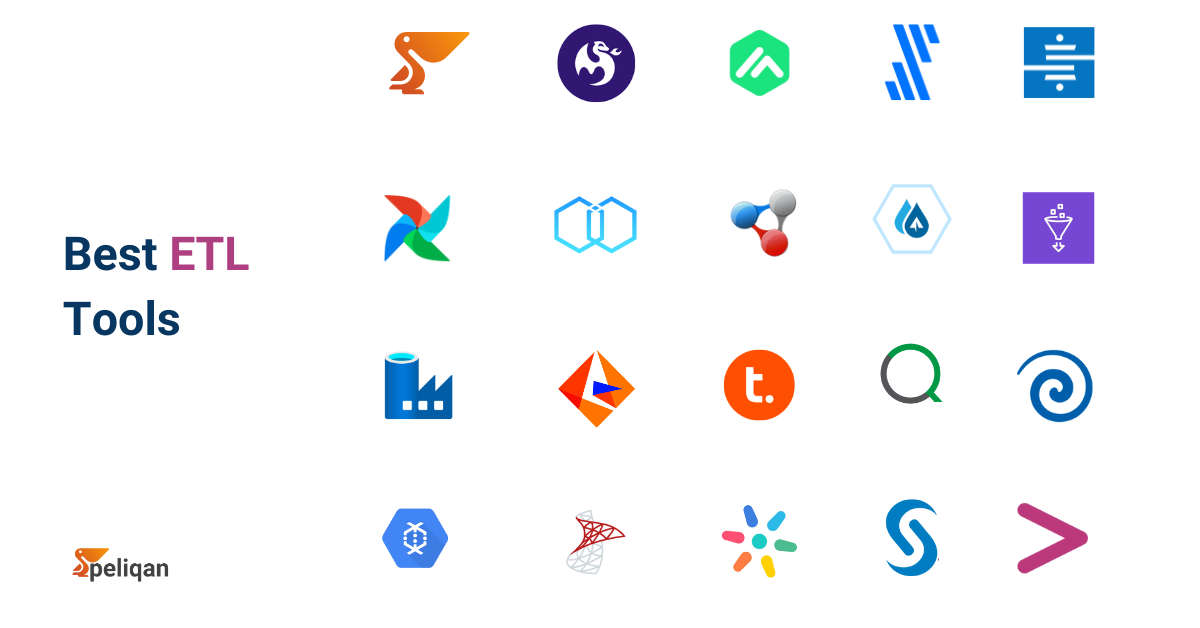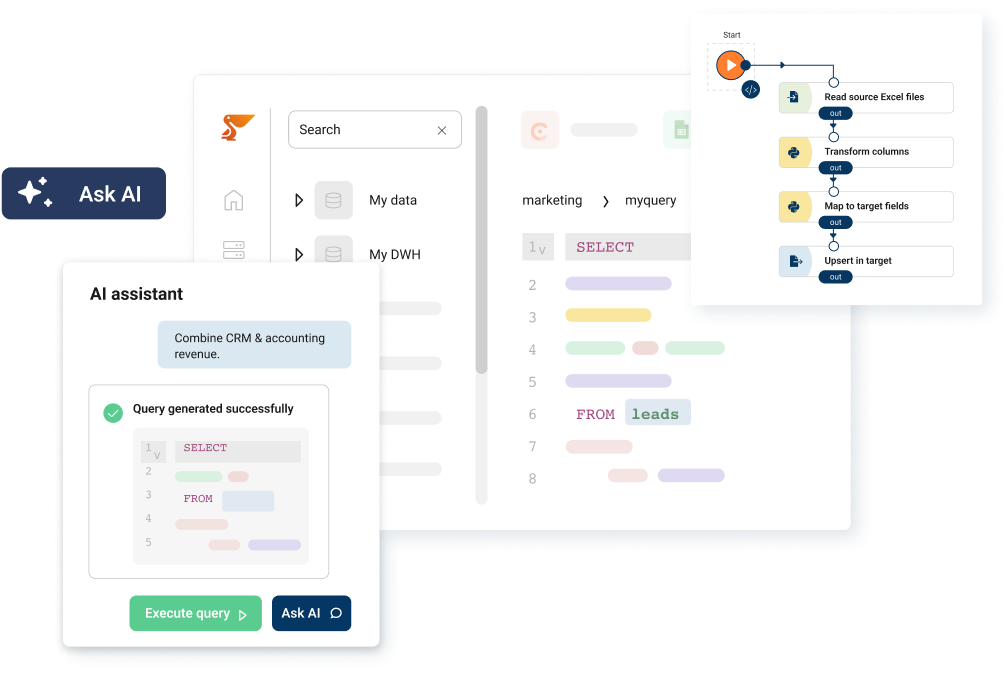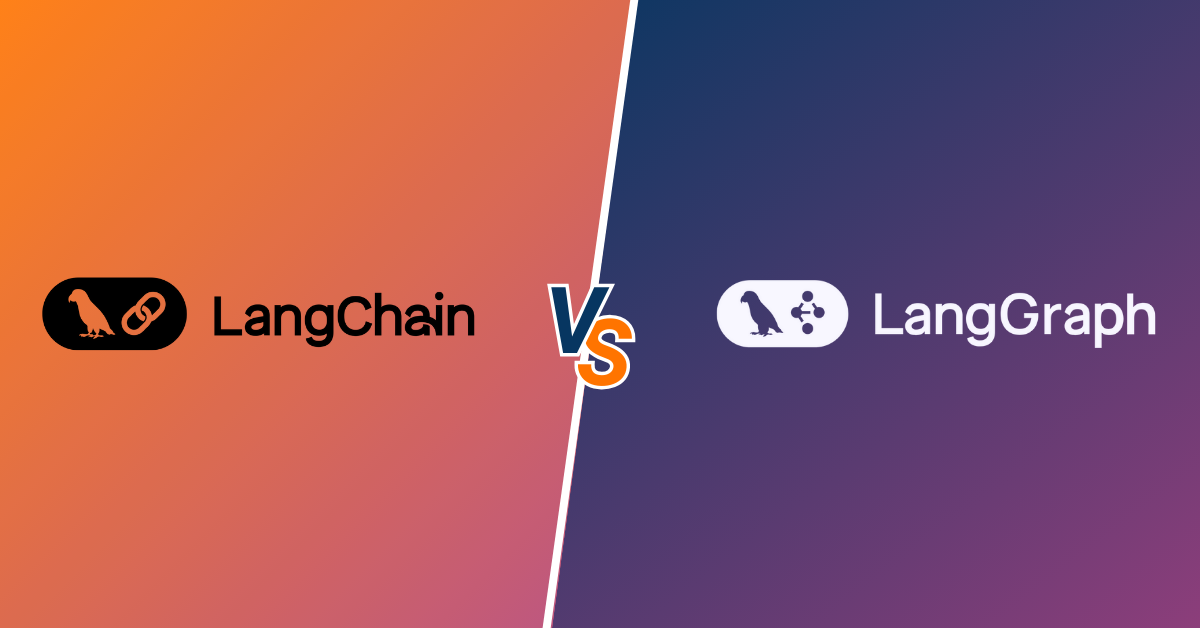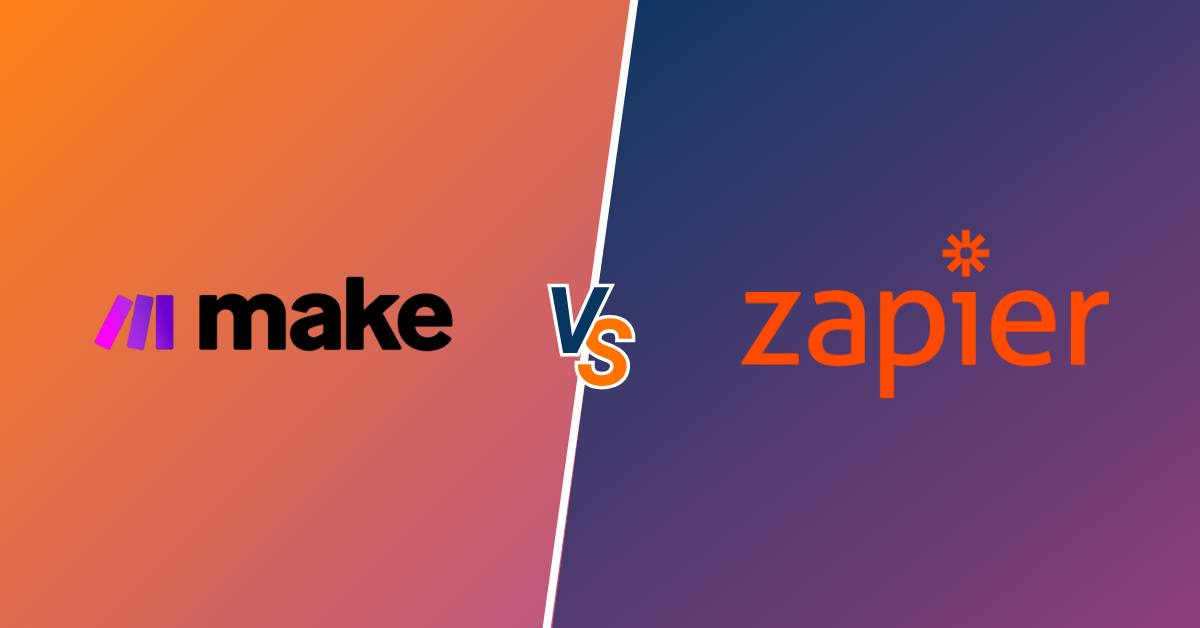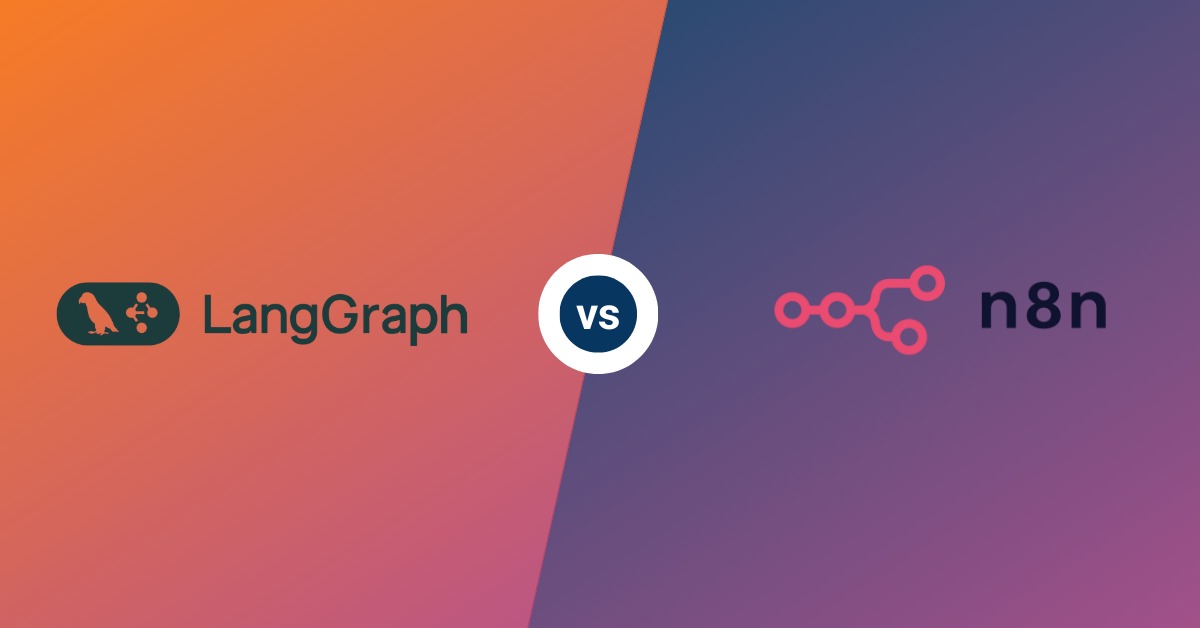In today’s world, businesses collect information from many places. This information, or data, can be very useful if it’s organized and easy to understand. ETL tools help turn this raw data into something helpful.
ETL stands for Extract, Transform, and Load. It’s like taking information from different places, cleaning it up, and putting it in a place where it’s easy to find and use. This helps businesses make better decisions.
In this comprehensive guide, we’ll explore the top ETL tools, diving deep into their functionalities, benefits, and how they’re revolutionizing data management.
ETL Tools List: Top 20 Covered
The ETL landscape is vast and varied, offering a plethora of tools to cater to diverse organizational needs. From small startups to large enterprises, there’s an ETL solution to fit every scale and complexity. While the specific tools and their features are constantly evolving, this guide will spotlight some of the most prominent players in the ETL market.
- Peliqan
- Meltano
- Matillion
- Fivetran
- Stitch
- Apache Airflow
- Integrate.io
- Oracle Data Integrator
- IBM InfoSphere DataStage
- AWS Glue
- Azure Data Factory
- Informatica PowerCenter
- Talend Open Studio
- Qlik Compose
- Pentaho Data Integration
- Google Cloud Dataflow
- Microsoft SQL Server Integration Services (SSIS)
- Hevo Data
- SAS Data Management
- Ab Initio
Top 20 ETL Tools
1. Peliqan: The All-in-One Data Platform
Leading the pack in ETL innovation is Peliqan, a comprehensive all-in-one data platform designed for business teams, startups, scale-ups, and IT service companies. What sets Peliqan apart is – low-code python & data activation capabilities.
Key Features of Peliqan
Seamless Connectivity: Peliqan offers easy connections to over 100 SaaS applications, databases, and file sources. Its one-click ETL functionality allows users to start exploring their data immediately after connecting to any data source.
Built-in Data Warehouse: With Peliqan, you get a built-in data warehouse, eliminating the need for additional setup. However, it also supports integration with popular data warehouses like Snowflake, BigQuery, Redshift, and SQL Server.
Flexible Transformation Options: Peliqan provides multiple ways to transform your data:
- SQL modeling for complex transformations
- Spreadsheet-like interface for business users
- Low-code Python scripting for advanced use cases
Data Activation: Beyond just storing and analyzing data, Peliqan enables you to activate your data through:
- Reverse ETL capabilities
- API endpoint publishing
- Alerting systems
- Custom report distribution
- Live data integration with Excel
AI-Powered Assistance: Peliqan’s AI assistant helps users write SQL queries by translating natural language questions into SQL, making data analysis accessible to non-technical users.
One-Click Tool Deployment: Peliqan’s marketplace allows users to deploy best-in-class tools like Metabase, Jupyter notebooks, Apache Airflow, and Apache Superset with a single click.
Data Lineage and Catalog: Automatically detect table and column lineage across various components of your data pipeline, and leverage a built-in Data Catalog for metadata management.
Use Cases for Peliqan
- SaaS Data Cockpit: Instantly access, combine, and report on data from all your SaaS applications.
- Developer Platform: Combine SQL with low-code Python to implement a wide range of data use cases.
- White-Label Solutions: Offer customers an all-in-one data platform under your own brand, perfect for integrators, software companies, and consultants.
- Marketing and Accounting Agencies: Become data-driven by analyzing revenue, spend, and implementing RevOps solutions for customers.
- Consulting Firms: Empower consultants to handle customer data at scale, pulling from various sources and preparing custom reports.
2. Meltano ETL Tool
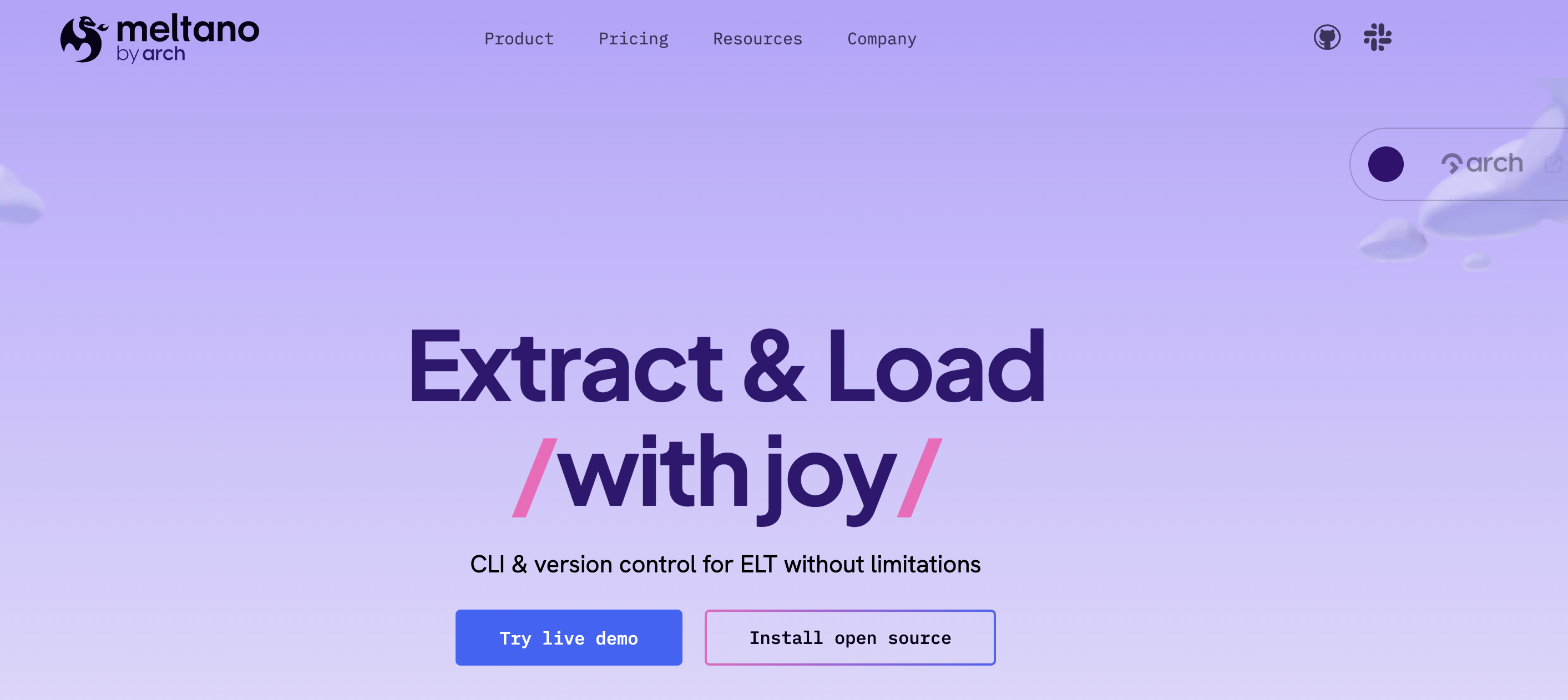
Meltano is an open-source DataOps platform that focuses on building and managing data pipelines. It offers a modular architecture, version control, and integration with popular data tools. Meltano is ideal for organizations seeking flexibility and customization in their data workflows.
Key Features of Meltano ETL
- Modular architecture with pluggable components
- Version control for data pipelines
- CLI and UI interfaces
- Integration with dbt for transformations
Use Cases
- Building end-to-end data pipelines
- Managing and versioning data workflows
- Orchestrating complex data tasks
- Integrating various data tools in a single platform
Additional Considerations: Requires some technical expertise for configuration and customization. Open-source model might not offer the same level of support as commercial tools.
3. Matillion ETL Tool
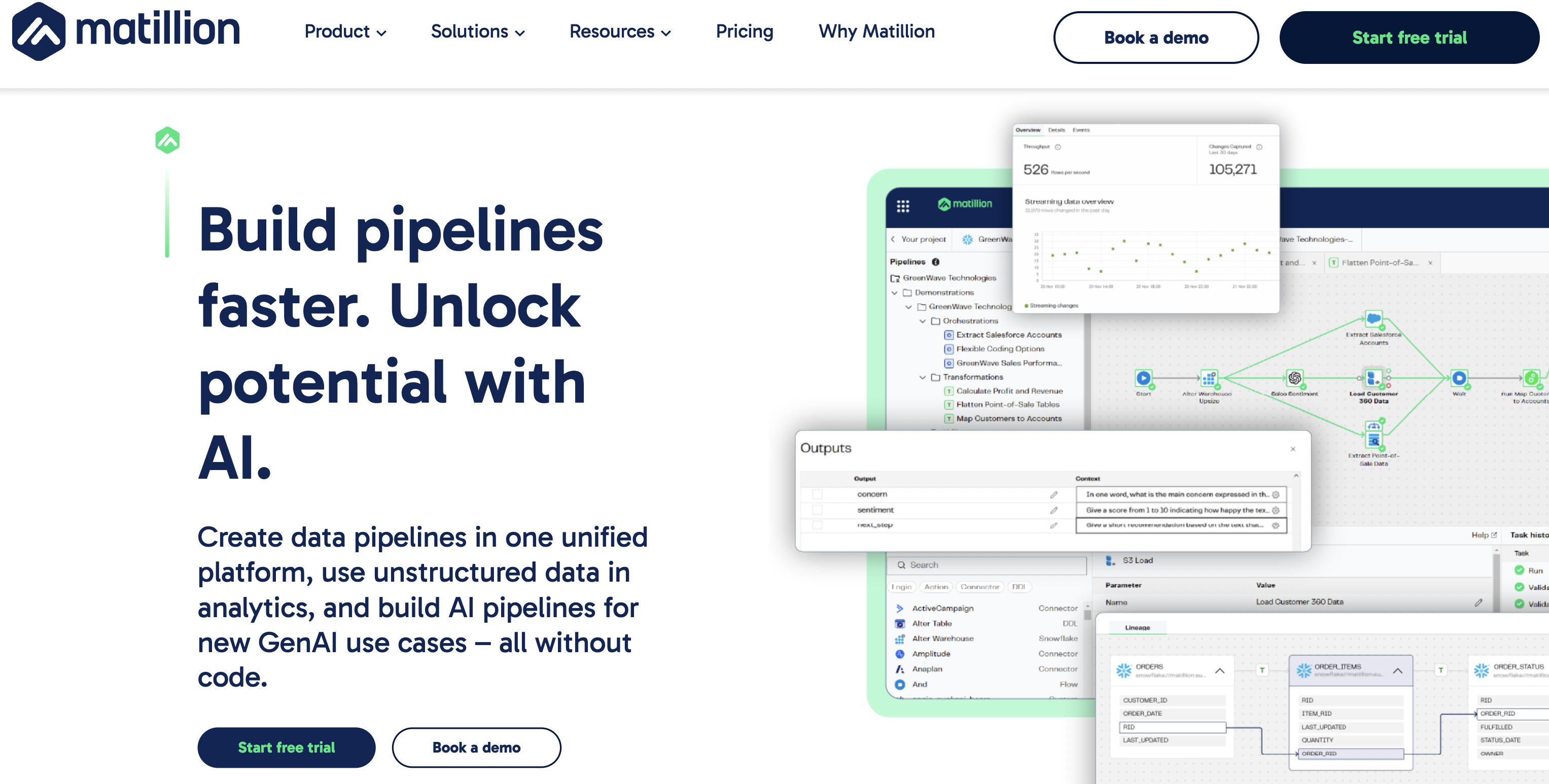
Matillion is a cloud-native ETL tool specifically designed for cloud data warehouses. It provides a visual interface for building and managing data pipelines, supports Python and SQL transformations, and offers strong integration with cloud platforms.
Key Features of Matillion ETL
- Native integration with cloud data warehouses
- Visual ETL/ELT job builder
- Support for Python and SQL transformations
- Built-in version control and collaboration features
Use Cases
- Loading and transforming data in cloud data warehouses
- Creating data marts for business intelligence
- Automating data workflows in the cloud
- Integrating data from multiple cloud sources
Additional Considerations: Primarily focused on cloud-based data management. May not be the best choice for on-premises data integration.
4. Fivetran ETL Tool
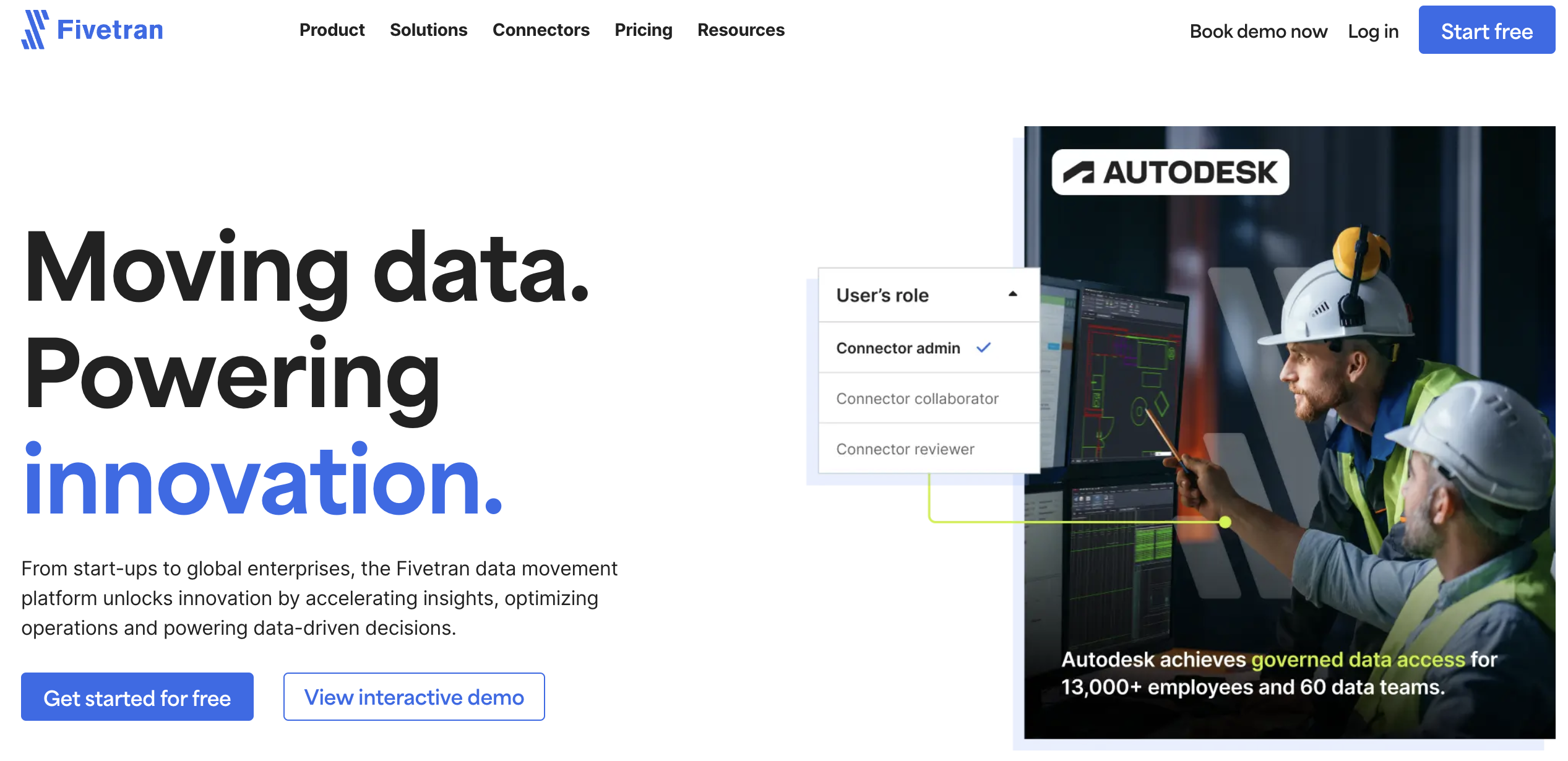
Fivetran is a fully managed ELT platform that automates data integration from various sources to cloud destinations. It offers pre-built connectors, automatic schema management, and real-time data replication. Fivetran is suitable for organizations prioritizing simplicity and reliability in data pipelines.
Key Features of Fivetran ETL
- Automated schema management and updates
- Wide range of pre-built connectors
- Real-time and batch data syncing
- Built-in data transformation capabilities
Use Cases
- Centralizing data from multiple SaaS applications
- Populating data warehouses and lakes automatically
- Enabling real-time analytics and reporting
- Simplifying data integration for small to medium businesses
Additional Considerations: Well-suited for cloud-based SaaS data integration with automated features. Limited customization options compared to some other tools.
5. Stitch ETL Tool
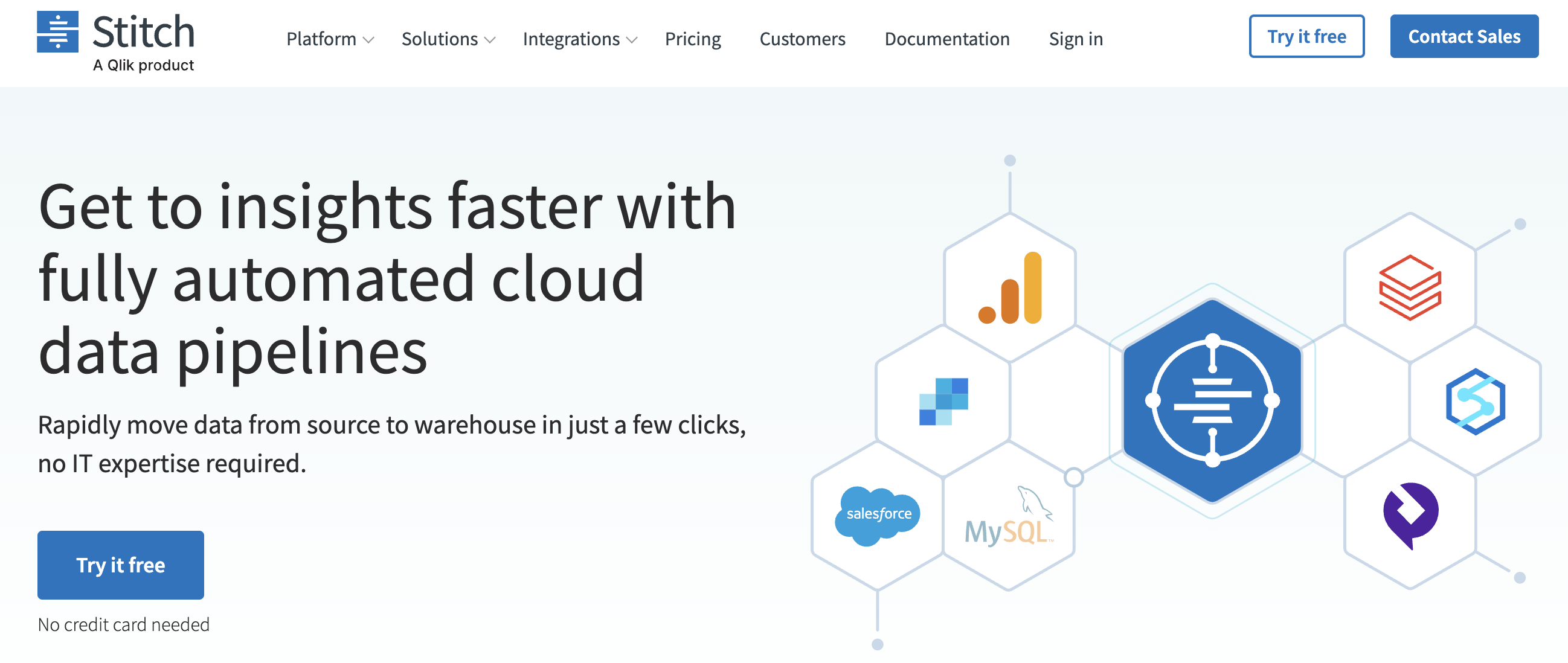
Stitch is a cloud-based ELT service that focuses on replicating data from various sources to data warehouses. It offers a self-service platform, supports custom integrations, and provides automatic schema detection. Stitch is well-suited for analysts and teams needing a flexible data integration solution.
Key Features of Stitch ETL
- Self-service ELT platform
- Extensive library of data source integrations
- Support for custom integrations via Singer
- Automatic schema detection and updating
Use Cases
- Replicating data from databases and SaaS applications
- Populating cloud data warehouses
- Enabling self-service data integration for analysts
- Supporting data-driven decision making across organizations
Additional Considerations: Primarily focused on data replication and analyst needs. Enterprise users might require more advanced features.
6. Apache Airflow ETL Tool
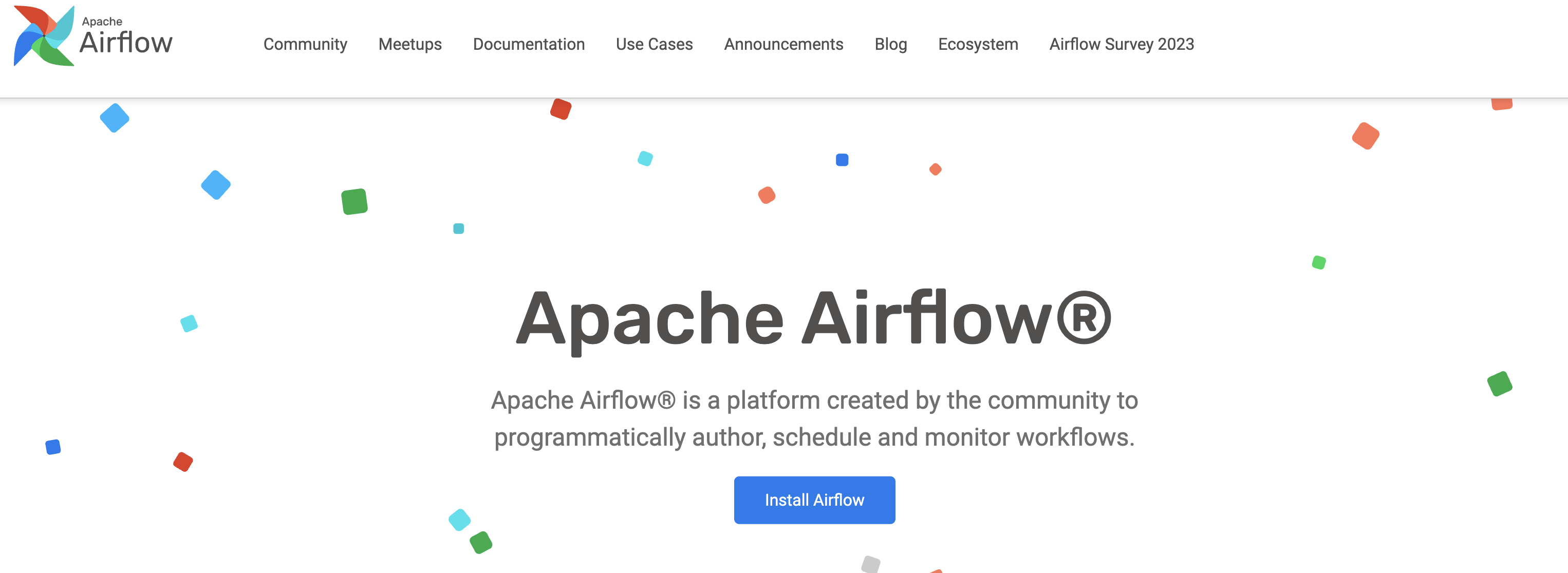
Apache Airflow is an open-source platform for programming and managing data workflows. It offers dynamic pipeline generation, extensibility through plugins, and a web-based UI for monitoring. Airflow is ideal for complex data pipelines and those requiring fine-grained control over workflow execution.
Key Features of Apache Airflow ETL
- Dynamic pipeline generation
- Extensible through plugins
- Web-based UI for monitoring and debugging
- Rich integration ecosystem
Use Cases
- Orchestrating complex ETL workflows
- Automating data pipeline processes
- Scheduling and monitoring data tasks
- Integrating various data processing tools
Additional Considerations: Requires development expertise for building custom workflows. Complex to manage for large-scale environments without proper orchestration.
7. Integrate ETL Tool
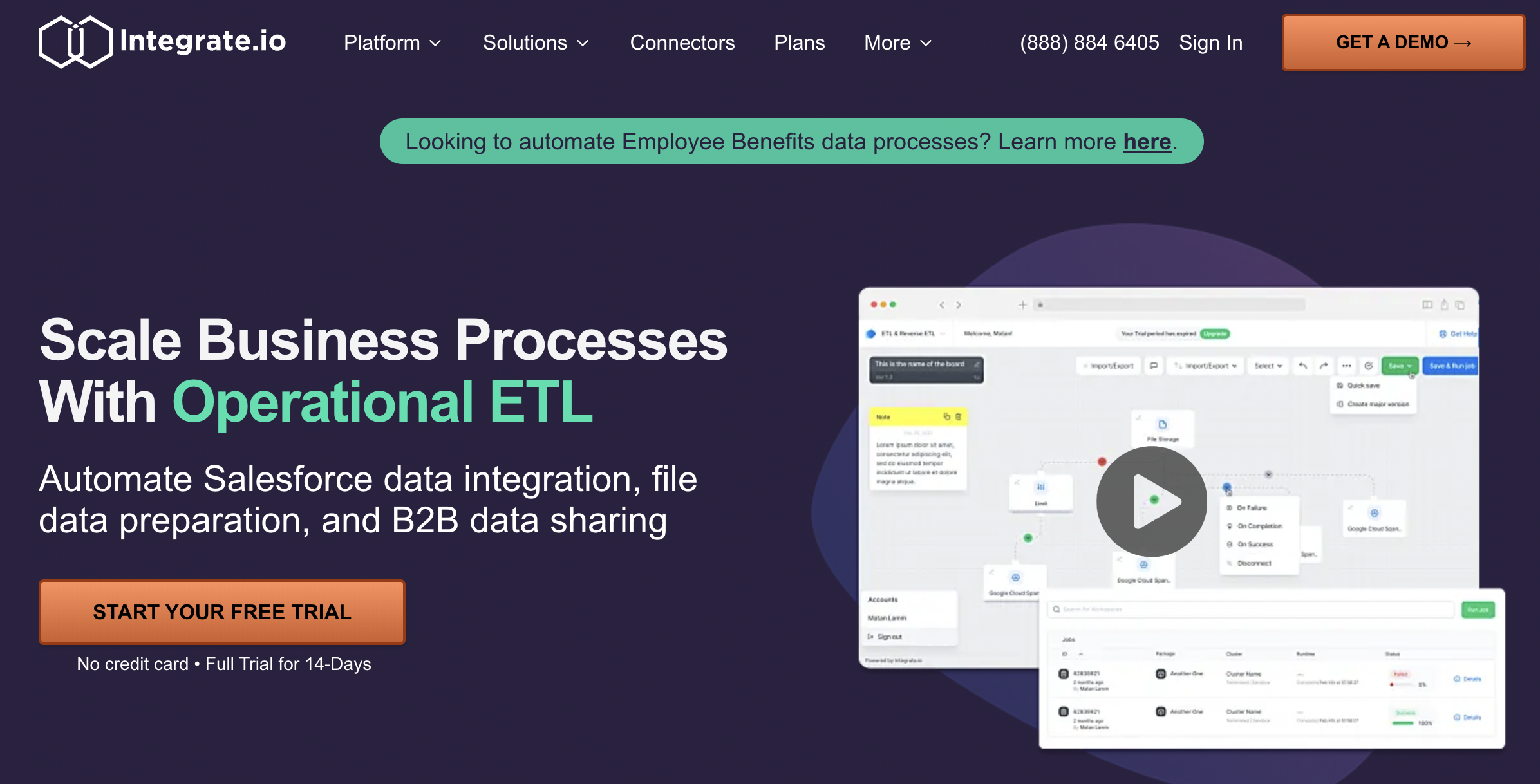
Integrate.io (formerly Xplenty) is a cloud-based ETL and ELT platform that provides a visual interface for building data pipelines. It offers pre-built connectors, data transformations, and data preparation features. Integrate.io is suitable for teams looking for a user-friendly platform for data integration and transformation.
Key Features Integrate ETL
- No-code/low-code data pipeline designer
- Pre-built connectors for various data sources
- Support for complex data transformations
- Built-in data preparation features
Use Cases
- Integrating data from multiple sources
- Preparing data for analytics and reporting
- Automating data workflows for business users
- Cleansing and transforming data for better quality
Additional Considerations: Might have limitations for complex data transformations or large-scale data integration projects.
8. Oracle Data Integrator ETL Tool

Oracle Data Integrator is a comprehensive data integration platform offering ETL, ELT, and data services. It integrates well with the Oracle ecosystem, supports big data, and provides advanced features for data management.
Key Features Oracle Data Integrator ETL
- ELT architecture for improved performance
- Knowledge modules for best-practice implementations
- Strong integration with Oracle ecosystem
- Support for big data and real-time integration
Use Cases
- Large-scale data warehouse projects
- Real-time operational intelligence
- Data migration and consolidation initiatives
- Master data management in Oracle environments
Additional Considerations: Primarily focused on the Oracle ecosystem. Might be more expensive compared to other options.
9. IBM InfoSphere DataStage ETL Tool
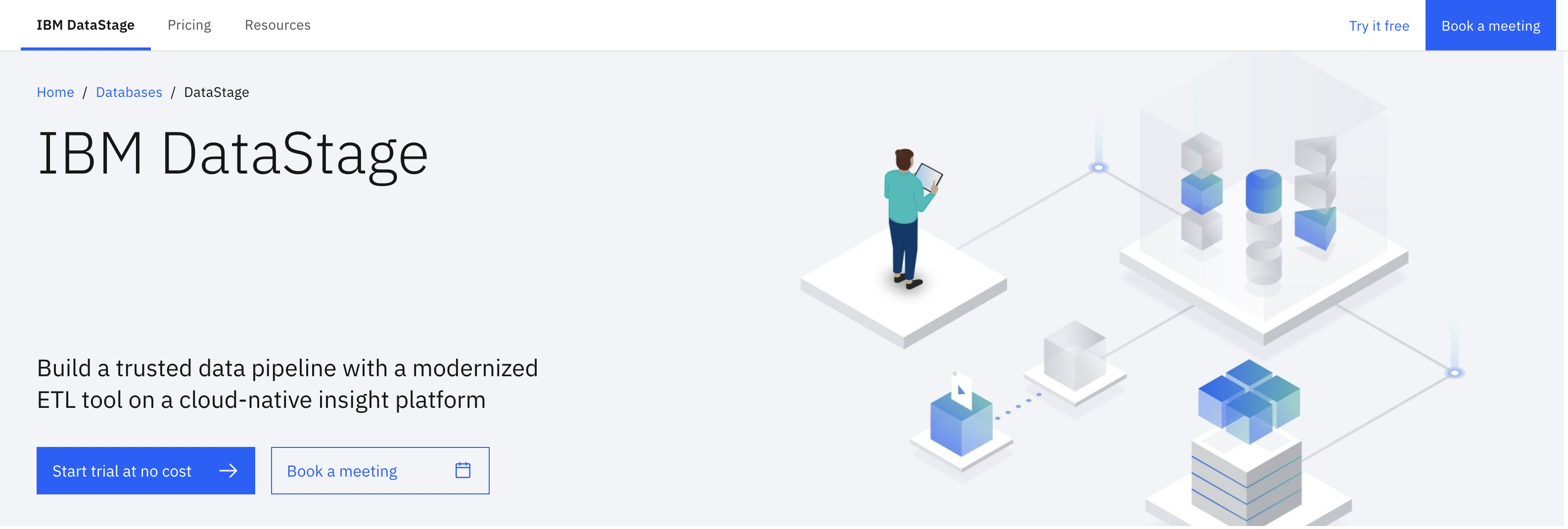
IBM InfoSphere DataStage is an ETL tool designed for high-performance data integration. It offers parallel processing, real-time and batch processing capabilities, and strong data quality features. DataStage is suitable for large-scale data integration projects.
Key Features IBM ETL
- Parallel processing for high-volume data
- Support for real-time and batch processing
- Extensive data source connectivity
- Built-in data quality features
Use Cases
- Enterprise-wide data integration initiatives
- Building and populating data warehouses
- Real-time data streaming and analysis
- Data migration and consolidation projects
Additional Considerations: High upfront costs and complex implementation process. Requires specialized skills for management.
10. AWS Glue ETL Tool

AWS Glue is a fully managed ETL service on the AWS cloud. It offers serverless architecture, automatic schema discovery, and integration with other AWS services. Glue is well-suited for organizations leveraging the AWS ecosystem for data processing.
Key Features AWS Glue ETL
- Serverless, pay-as-you-go model
- Automatic schema discovery
- Support for Python and Scala
- Visual ETL job editor
Use Cases
- Preparing and loading data into AWS data lakes
- Automating ETL workflows in AWS environments
- Cataloging and discovering enterprise data assets
- Transforming data for analytics and machine learning
Additional Considerations: Tightly coupled with the AWS ecosystem. Might have limitations for complex data transformations.
11. Azure Data Factory ETL Tool

Azure Data Factory is a cloud-based data integration service from Microsoft. It offers a visual pipeline designer, integration with Azure and on-premises data sources, and support for both code-free and code-based transformations.
Key Features Azure Data Factory ETL
- Visual pipeline designer
- Integration with Azure and on-premises data sources
- Support for both code-free and code-based transformations
- Built-in scheduling and monitoring capabilities
Use Cases
- Migrating on-premises data to the cloud
- Building end-to-end analytics pipelines in Azure
- Integrating data across hybrid environments
- Orchestrating data movement and transformation at scale
Additional Considerations: Best suited for organizations heavily invested in the Microsoft ecosystem. Might have limitations for complex data integration scenarios.
12. Informatica PowerCenter ETL Tool

Informatica PowerCenter is a comprehensive enterprise data integration platform. It offers advanced data transformations, metadata-driven architecture, and strong data quality features. PowerCenter is suitable for large-scale, complex data integration projects.
Key Features Informatica ETL
- Advanced data transformation capabilities
- Metadata-driven architecture
- High-performance data integration engine
- Robust data quality and profiling tools
Use Cases
- Enterprise-wide data integration and governance
- Complex ETL processes for large organizations
- Master data management initiatives
- Data migration and consolidation projects
Additional Considerations: High cost and complex implementation. Requires specialized skills for management.
13. Talend ETL Tool

Talend Open Studio is an open-source ETL tool providing a visual job designer and support for big data integration. It offers a balance of features and community support. Talend is suitable for organizations seeking a cost-effective and flexible ETL solution.
Key Features Talend ETL
- Open-source with community support
- Visual job designer
- Wide range of connectors and components
- Support for big data technologies
Use Cases
- Building data integration workflows
- Preparing data for business intelligence
- Migrating data between different systems
- Prototyping ETL processes before scaling
Additional Considerations: While open-source, enterprise support might come at a cost. Limited enterprise-grade features compared to commercial tools.
14. Qlik Compose ETL Tool

Qlik Compose (formerly Attunity Compose) is a data warehouse automation tool. It offers automated data warehouse design, model-driven development, and continuous data warehouse updates. Compose is suitable for organizations seeking to accelerate data warehouse development and management.
Key Features Qlik ETL
- Automated data warehouse design and implementation
- Model-driven development approach
- Continuous data warehouse updates
- Integration with Qlik’s data integration suite
Use Cases
- Accelerating data warehouse development
- Automating ETL processes for data warehouses
- Maintaining and updating data models efficiently
- Enabling agile BI and analytics initiatives
Additional Considerations: Primarily focused on data warehousing automation. Might have limitations for complex data integration scenarios.
15. Pentaho ETL Tool
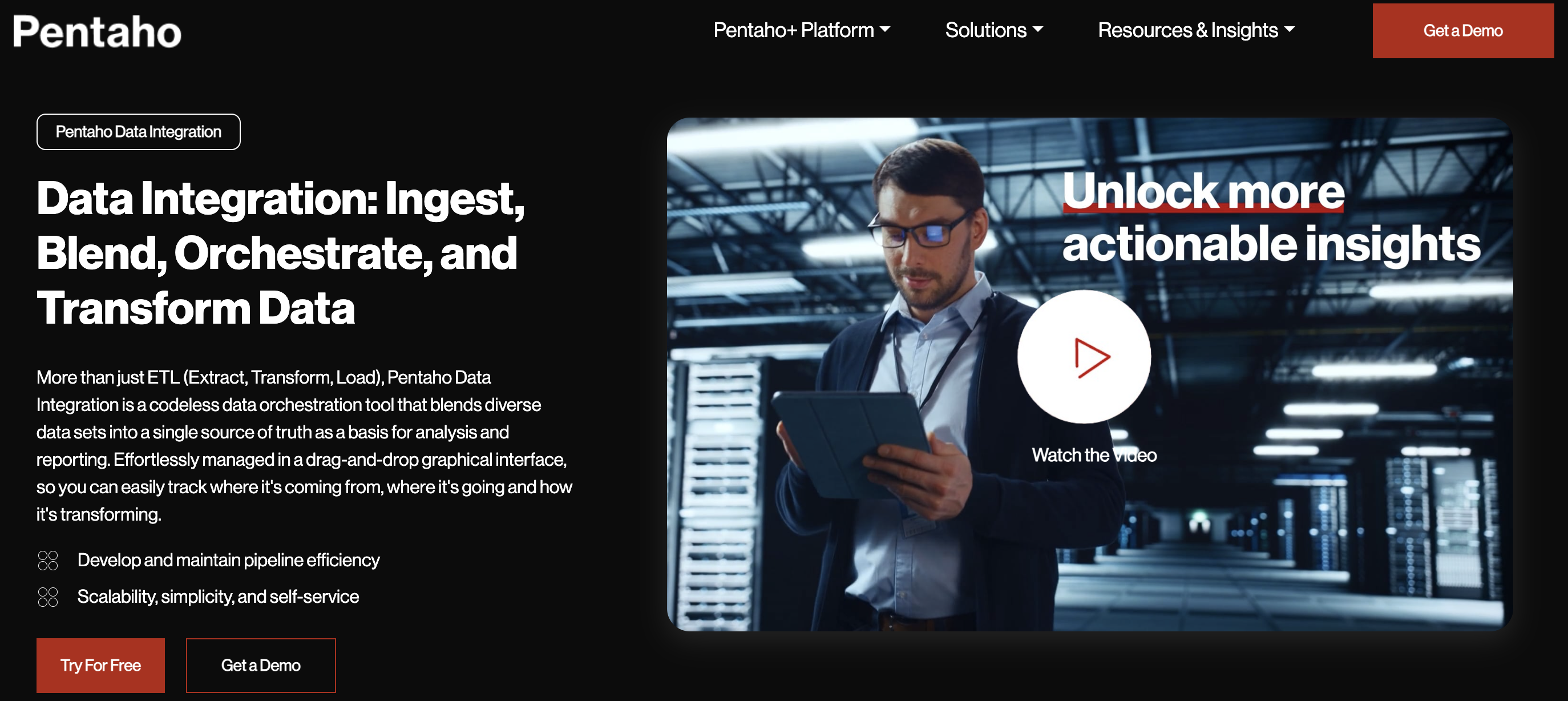
Pentaho Data Integration (PDI), also known as Kettle, is an open-source ETL tool offering a visual design environment, plugin architecture, and support for big data. PDI is suitable for organizations seeking a flexible and customizable ETL solution.
Key Features of Pentaho ETL
- Visual design environment
- Extensible plugin architecture
- Support for big data integration
- Built-in scheduling and monitoring
Use Cases
- Designing and implementing ETL processes
- Integrating data from various sources
- Preparing data for analytics and reporting
- Automating data workflows
Additional Considerations: While open-source, enterprise support might come at a cost. Complex to manage for large-scale environments without proper orchestration.
16. Google ETL Tool
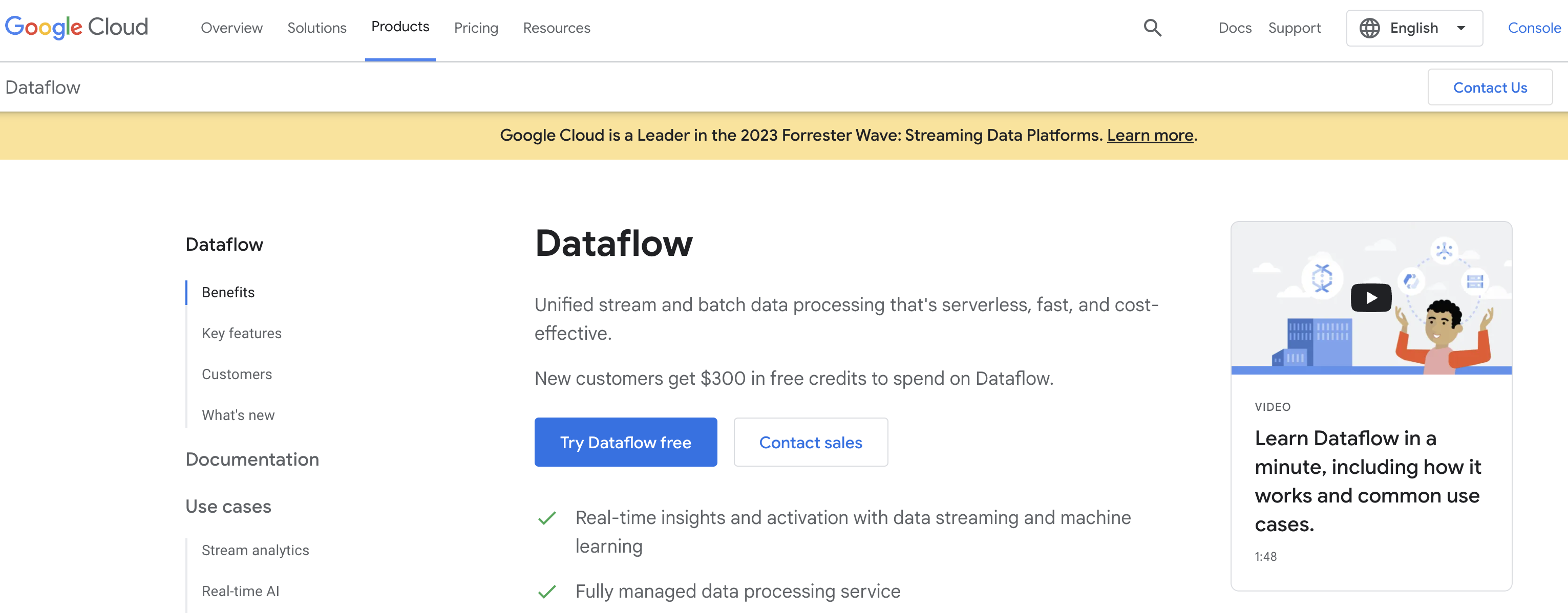
Google Cloud Dataflow is a fully managed service for executing Apache Beam pipelines on Google Cloud Platform. It supports batch and streaming data processing, auto-scaling, and integration with GCP services. Dataflow is suitable for complex data processing and real-time analytics workloads.
Key Features of Google ETL tool
- Unified programming model for batch and streaming
- Auto-scaling and auto-tuning of resources
- Built-in integration with GCP services
- Support for complex data processing patterns
Use Cases
- Real-time data processing and analytics
- ETL for data warehousing in BigQuery
- Fraud detection and anomaly detection
- IoT data processing and analysis
Additional Considerations: Tightly coupled with the Google Cloud Platform ecosystem. Might have higher costs compared to other cloud-based solutions.
17. Microsoft SQL Server Integration Services (SSIS) ETL Tool

SSIS is a data integration platform integrated with SQL Server. It offers a visual ETL designer, built-in transformations, and strong integration with the Microsoft ecosystem. SSIS is suitable for organizations primarily using Microsoft technologies for data management.
Key Features of SSIS ETL tool
- Visual ETL designer integrated with Visual Studio
- Extensive built-in transformations
- Strong integration with Microsoft ecosystem
- Support for both GUI-based and script-based development
Use Cases
- Data warehouse and mart loading
- Data migration between different systems
- Automating administrative tasks in SQL Server
- Integrating data from multiple sources in Microsoft environments
Additional Considerations: Limited to the Microsoft ecosystem. Might not be suitable for complex or large-scale data integration projects.
18. Hevo Data ETL Tool

Hevo Data is a fully automated, no-code data pipeline platform. It offers real-time data replication, automatic schema mapping, and pre-built connectors. Hevo is suitable for organizations seeking a quick and easy way to integrate data from multiple sources.
Key Features of Hevo Data ETL
- No-code data pipeline setup
- Real-time data replication
- Automatic schema mapping and migration
- Pre-built connectors for 150+ data sources
Use Cases
- Centralizing data from various SaaS applications
- Enabling real-time analytics
- Simplifying data integration for non-technical users
- Replicating databases to cloud data warehouses
Additional Considerations: Limited customization options compared to other tools. Might not be suitable for complex data transformations.
19. SAS ETL Tool
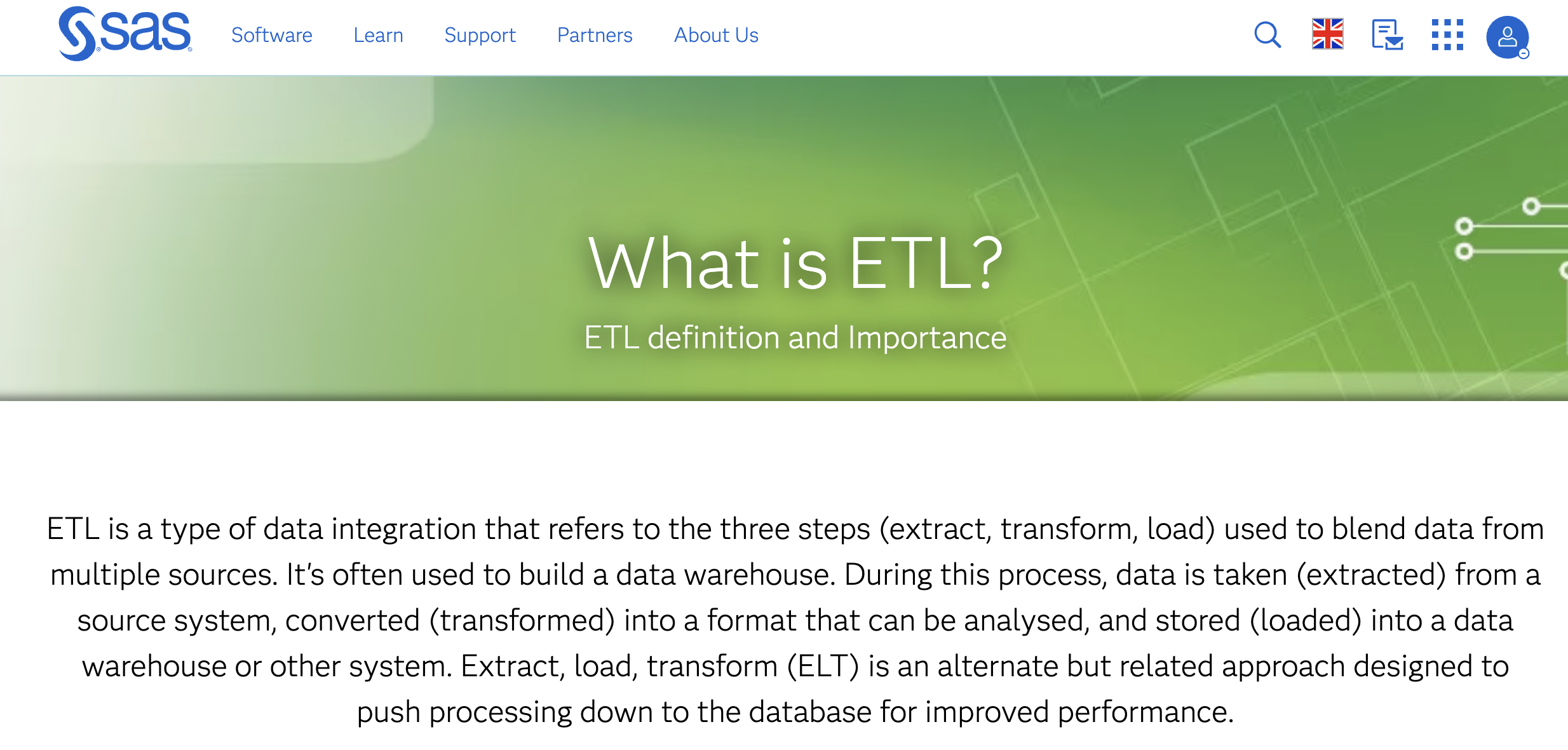
SAS Data Management is a comprehensive suite of ETL and data quality tools. It offers data quality features, metadata management, and integration with the SAS analytics suite. SAS is suitable for organizations using the SAS platform for analytics and requiring advanced data management capabilities.
Key Features of SAS ETL
- Data quality and cleansing tools
- Metadata management capabilities
- Support for big data technologies
- Integration with SAS analytics suite
Use Cases
- Enterprise-wide data integration and quality initiatives
- Preparing data for advanced analytics and machine learning
- Master data management and data governance
- Data migration and consolidation projects
Additional Considerations: High cost and primarily focused on the SAS ecosystem. Might not be the best choice for organizations not already using SAS.
20. Ab Initio ETL Tool
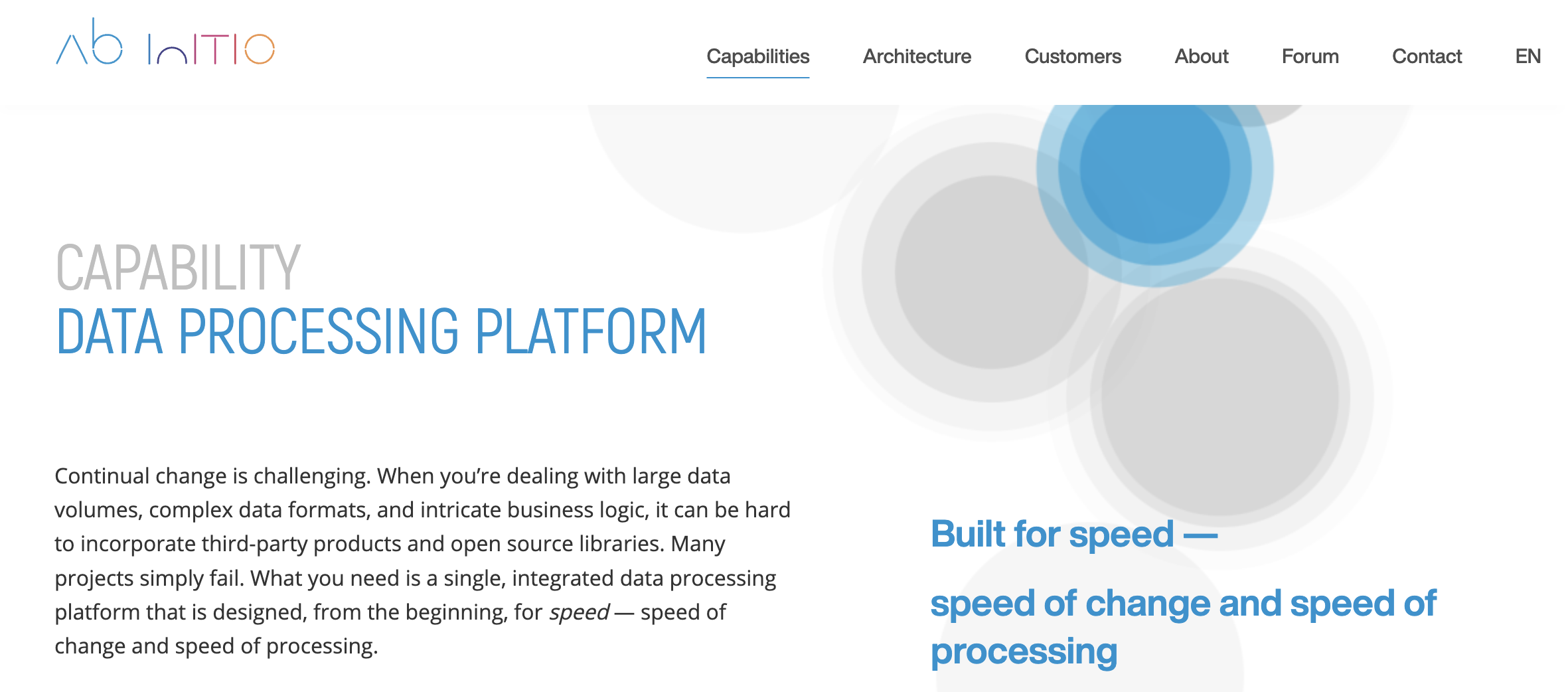
Ab Initio is a high-performance data integration platform designed for handling large and complex data processing tasks. It offers a comprehensive suite of tools for data extraction, transformation, and loading.
Key Features of Ab Initio ETL Tool
- Highly scalable and parallel processing capabilities
- Graphical development environment
- Strong data lineage and impact analysis features
- Supports both batch and real-time processing
Use Cases
- Large-scale data warehousing and data mart implementations
- Complex data integration projects involving multiple heterogeneous sources
- Real-time data processing and analytics applications
Additional Considerations: High cost and complex implementation. Requires specialized technical expertise for development and maintenance.
ETL Tools Comparison Table
This ETL tools comparison table provides a quick overview of the ETL tools based on key factors that organizations often consider when choosing an ETL solution. It can help readers quickly identify tools that might be suitable for their specific needs and environment.
Choosing the Right ETL Tool
Selecting the optimal ETL tool is pivotal for efficient and effective data management. Consider these key factors when making your decision:
Core ETL Tool Considerations
- Ease of Use: Evaluate the tool’s user interface, learning curve, and ability to accommodate users with varying technical expertise.
- Scalability: Assess the tool’s capacity to handle increasing data volumes and complexity over time.
- Integration Capabilities: Consider the breadth and depth of data sources and targets the tool supports.
- Deployment Flexibility: Evaluate on-premises, cloud, or hybrid deployment options to align with your infrastructure.
- Cost-Effectiveness: Balance upfront costs, ongoing expenses, and return on investment.
- Advanced Features: Determine if the tool offers capabilities like data quality, machine learning, or reverse ETL to meet specific requirements.
- Support and Community: Evaluate the vendor’s support resources and the size and activity of the tool’s user community.
Additional Factors
- Data Volume and Velocity: Consider the amount and speed of data you need to process.
- Data Complexity: Evaluate the tool’s ability to handle complex data transformations and cleaning.
- Data Quality: Assess the tool’s features for data profiling, cleansing, and validation.
- Performance: Consider the tool’s speed and efficiency in handling large datasets.
- Security and Compliance: Evaluate data security and privacy features to meet regulatory requirements.
- Cloud Integration: If using cloud-based data platforms, ensure seamless integration.
- Data Governance: Consider the tool’s capabilities for data lineage, metadata management, and access control.
By carefully evaluating these factors and aligning them with your organization’s specific needs, you can select the ETL tool that best empowers your data initiatives.
Conclusion
ETL tools play a crucial role in modern data management, enabling organizations to harness the full potential of their data. From all-in-one platforms like Peliqan to specialized tools for specific use cases, the ETL landscape offers solutions for every need and skill level.
As data continues to grow in volume, variety, and velocity, the importance of efficient and flexible ETL processes will only increase. By choosing the right ETL tool and implementing best practices, organizations can turn their raw data into valuable insights, driving innovation and competitive advantage in the data-driven economy.
Whether you’re a small startup looking for an easy-to-use solution or a large enterprise requiring the scalability of tools, there’s an ETL tool out there to meet your needs. The key is to carefully evaluate your requirements, consider your team’s skillset, and choose a solution that can grow with your organization’s data needs.
Remember, the goal of ETL is not just to move data from one place to another, but to transform it into a valuable asset that can drive better decision-making and business outcomes. With the right ETL tool in your arsenal, you’ll be well-equipped to tackle the data challenges of today and tomorrow.




